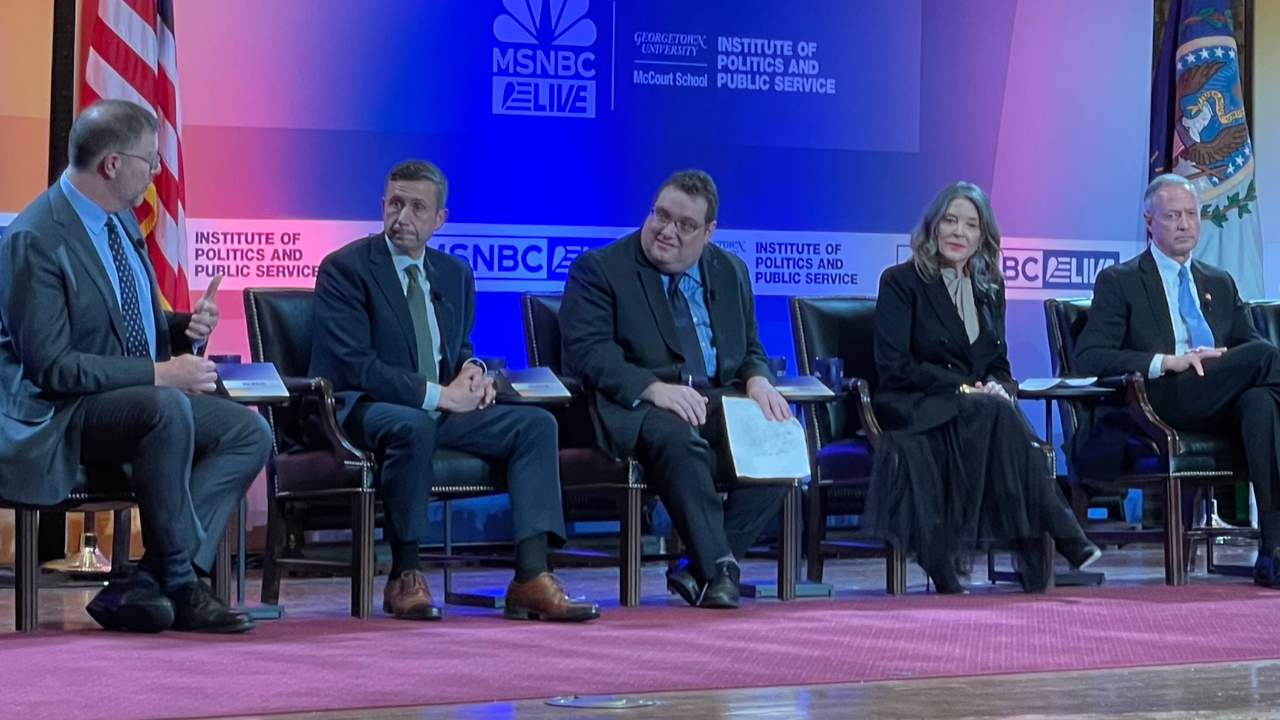It’s never too soon to start crafting your #HealthcarePolicyValentines (or to get moving on a dinner reservation for Feb. 14) You can follow me through the week on Bluesky, threads and X. Here we go.
*** Want to get my column in your inbox every Friday? Just sign up right here. ***
1. STORY OF THE WEEK: If the past week tells us anything, here are a few starting points: 1) Democratic-leaning states like Rhode Island are in no way immune from the changes emanating from the White House under President Trump; 2) The policies being put into place pose a mix of uncertainty and very tangible effects; and 3) the long-term political fallout is anyone’s guess. The whirlwind was front and center Wednesday. U.S. Rep. Seth Magaziner was among the Democrats responding to a Trump administration freeze on trillions of dollars in federal loans and grants. (Congress made it illegal in 1974 for presidents to refuse to spend appropriated funds.) During a news conference at his Warwick office, Magaziner called Trump’s move part of an effort to implement Project 2025 — the controversial policybook that 47 tried to distance himself from during the campaign last year. A short time later, reports surfaced that the White House had rescinded its freeze on grants and loans. Trump’s press secretary, Karoline Leavitt, chimed in to say it wasn’t a recission of the freeze, “It is simply a rescission of the OMB memo. Why? To end any confusion created by the court’s injunction.” Leavitt’s tweet quickly gained notice in U.S. District Court Judge Jack McConnell’s Providence courtroom, as he considered a temporary restraining order requested against the Trump administration by attorneys general from 23 states, including Rhode Island’s Peter Neronha. Local nonprofits were among those troubled by the uncertainty and possible funding cut emanating from Washington. And while the funding freeze was held at bay in the short term, the clash marked another opening volley in the early weeks of the presidential administration. According to a White House news release, “the Golden Age of America …. is upon us.” Back in Warwick, speaking almost exactly three years after he announced his run in CD2, Magaziner pledged a vigorous response by Democrats. He also predicted Trump could face a rude awakening ahead of mid-term elections in 2026, since the GOP holds just a three-seat margin in the U.S. House and may need Democratic votes to fund the government or other key measures. “If they keep this stuff up, public opinion is going to shift against them dramatically,” Magaziner said, asserting that proposed cuts to Medicaid and the blanket pardon of Jan. 6 rioters are very unpopular.
2. NOMINEES: U.S. Sen. Sheldon Whitehouse this week told Robert F. Kennedy Jr., the controversial nominee to lead Health and Human Services for the Trump administration, “Frankly, you frighten people” due to his lengthy record of opposing vaccines. After Kennedy pledged to work with Whitehouse in addressing concerns on funding through the Centers for Medicare and Medicaid Services (CMS), Whitehouse said he’s learned that such pledges from nominees amount to zero. Whitehouse’s skeptical line toward Kennedy comes about a week after some Democrats expressed concern about how he would vote on the controversial nominee.
3. THE OPPOSITION: As the Trump administration settles in, should elected officials in Rhode Island sharply resist or pursue a more diplomatic approach in the hopes of maintaining a better stream of federal dollars? It hardly seemed coincidental that California Gov. Gavin Newsom, a Democrat, is seeking to improve his relationship with Trump as the Golden State reels from wildfires. Perhaps the importance of federal money — which forms close to half of the state budget in Rhode Island — explains why Gov. Dan McKee’s office issued a low-key release earlier this week indicating how “state agencies are actively reviewing all programs and investments, both current and projected, that rely on federal funding to determine the true extent of this order and to take steps to optimize the continued flow of these funds wherever possible.” By contrast, AG Peter Neronha and members of the congressional delegation responded more sharply. Where Democrats stand will be a bigger issue as we head into the 2026 campaign season. In a statement made when the freeze was still in place, Georgia Hollister Isman, regional head of the progressive Working Families Party, said in part, “With the stroke of a pen, Trump and his billionaire loyalists are robbing cancer patients of medication, families of food, and Americans of paychecks for serving our communities.” She added, “There’s sides to this fight,” asserting that McKee and other leaders “need to prove that Rhode Island’s government is ready and willing to fight for working people.”
4. DEMOCRATS IN THE WILDERNESS: Via On Point, distributed from WBUR: “Decades ago, Ruy Teixeira famously wrote that a more diverse America would lean heavily Democratic. But as he’s watched Donald Trump’s rise, he believes it’s Democrats themselves who are to blame. Why?” Teixeira’s prescription for Democrats comes down to three things: moving to the center on cultural issues, embracing a more patriotic message, and emphasizing an abundance agenda of economic growth for all.
5. THE DC CRASH: Accidents happen even under the best of circumstances and it will take time to identify the cause of the heartbreaking collision between a jet and a military helicopter that claimed the lives, among 58 others, of Spencer Lane, a promising 16-year-old ice skater from Barrington, and his mother, Christine. Without evidence, President Trump blamed DEI programs that existed before he took power. Emerging clues “suggest that multiple layers of the country’s aviation safety apparatus failed,” The New York Times reported, citing “flight recordings, a preliminary internal report from the Federal Aviation Administration, interviews with current and former air traffic controllers and others briefed on the matter.”
6. HOSPITALS: California-based Prospect Medical Holdings hopes to receive approval in U.S. Bankruptcy Court on Feb. 6 to sell the assets of Pennsylvania-based Crozer Health to a not-for-profit consortium. If that move wins a green light, it would seem to augur well for the planned sale of Roger Williams Medical Center in Providence and Our Lady of Fatima Hospital in North Providence to the Atlanta-based Centurion Foundation.
7. RESEARCH BLOCKED: The National Institutes of Health abruptly canceled long-scheduled grant review panels and ceased external communication, with little explanation, reports my colleague Nina Sparling: “Dr. Philip Chan, associate professor at Brown University and chief medical officer at Open Door Health, a Providence clinic, said he had ‘not seen anything like this before’ and that it ‘saddens’ him to see research-based clinical and public health institutions ‘undermined and chipped away at.’ His research projects have received millions in NIH funding in recent years, dollars that allow him to employ teams of researchers and cover hard costs like equipment. Chan said that if he lost grant funding, it would put dozens of jobs on the line. And he’s not alone. Between 2019 and 2023, the most recent year for which data are available, researchers in Rhode Island received roughly $250 million a year in grant funding from the National Institutes of Health. Most — nearly 55% — of those dollars went to researchers at Brown University, supporting inquiry into issues ranging from overdose prevention, to Alzheimer’s, to HIV prevention.”
8. HOUSING: On the surface, Johnston Mayor Joseph Polisena Jr. is more understated than his father, the former mayor, but he shows the same kind of willingness to make bold use of his power. The latest example is the Polisena-backed plan to use eminent domain to seize the land planned for a 250-plus unit housing development. Housing advocates say the development is badly needed, while Polisena said it would strain municipal resources. The clash has broader implications. Helena Foulkes, who cultivated a political relationship with Polisena, “does not agree with this approach,” according to her campaign. Meanwhile, House Speaker Joe Shekarchi, a potential candidate for governor, remains opaque on what would cause him to take a more punitive approach to communities that resist efforts to add housing. “Mayor Polisena and the Johnston Town Council acted in what they believe was in the best interests of the citizens of their community,” Shekarchi said in a statement. “However, I hope Johnston and every community in Rhode Island look to create more affordable housing opportunities to address the ongoing housing crisis. I would encourage Johnston to consider repurposing the existing police and fire buildings, once vacated, for affordable Housing.”
9. RI POLI-MEDIA-LITERARY PEOPLE ON THE MOVE: Bay state political maven Joe Caiazzo, who ran U.S. Sheldon Whitehouse’s 2018 campaign, has a new consulting shop, 1788 Media. According to Politico, the launch “is the latest sign that Democrats are reorienting themselves in the second Trump era and beginning to chart a path back to power.” …. Congrats to PR man Chris Raia and his better half, longtime state government stalwart Brenna McCabe, on the arrival of Casey McCabe Raia …. Congrats, too, to my friend Christina Bevilacqua on being named executive director of LitArtsRI …. Frank Karpinski, executive director of the Employees Retirement System of Rhode Island, is set to retire at the end of the fiscal year, after more than three decades on the job. In a statement, General Treasurer James Diossa said, “Frank’s tenure and contributions to ERSRI and the state have been remarkable. His unparalleled knowledge and insightful guidance have been essential in ensuring our continued focus on serving ERSRI members and all Rhode Islanders. We are incredibly grateful for his dedication and leadership throughout his tenure, and we look forward to ensuring a seamless transition as we search for a new executive director.”
10. SINGLE-PAYER: Will growing frustration with the insurance industry eventually lead to more support for a single-payer healthcare plan? If you ask state Sen. Linda Ujifusa (D-Portsmouth), who, like her husband, Dr. Mark Ryan, is a big supporter of the concept, the answer is ‘yes.’ Asked how she would pay for the change, Ujifusa offered this response on Political Roundtable: “It’s already being paid for, believe it or not. We pay twice per capita what other industrialized countries pay for health insurance. And they have better health outcomes. They see their doctors more. They stay in the hospital more. They are not having hospitals go out of business. And so, you know, we are already paying for it. We pay about $11,000 per person. And Canada pays about, I think, $5,500. So we’re paying for it already through taxes that pay for things like Medicaid, or the VA, or whatever, and through your premium payments.”
11. SMITH HILL NOTES: Critics of President Trump’s approach on immigration are expected to picket a Feb. 4 fundraiser being staged by Senate GOP Leader Jessica de la Cruz at Ladder 133 in Providence …. Pickets are also expected for Gov. McKee’s fundraiser Monday at the Crown Plaza by union members, including the RI Brotherhood of Correctional Officers, although the two sides were still talking about a possible resolution as TGIF was going to press …. State Rep. Justine Caldwell (D-East Greenwich) has been named chair of the House Conduct Committee …. The Rhode Island Black, Latino, Indigenous, Asian-American and Pacific Islander Caucus held its first meeting of 2025. Sen. Tiara Mack (D-Providence) and Rep. David Morales (D-Providence) were elected as the new co-chairs.
12. MEDIA NOTES: Joseph F. Nunes, who worked for the Hartford Courant for 38 years, offers a compelling read on the decline of an American newspaper, dating the turning point to well before the advent of the internet. (Nunes is the uncle of Alex Nunes, interim managing editor at The Public’s Radio). Excerpt: “I viewed our collective work at The Courant as a vital social service, the proverbial beacon of democracy cutting through the fog, especially in the wake of Watergate. We kept readers informed about everything, from mundane school lunch menus to scintillating scientific breakthroughs, from late-night zoning meetings to municipal corruption scandals. We all felt the grandeur of the Courant’s unique history – ‘Older than the nation, as new as the news,’ as the slogan went. In the newsroom, we spoke truth to power, always striving to root out the truth, ‘with malice toward none,’ as legendary sportswriter Bill Lee titled his column. Every day there would be something in the newspaper, however innocuous, that would change people’s lives, I often reminded colleagues. And that would be validated time after time.” …. Dan Kennedy reports on the AP leaving the Massachusetts Statehouse … A Rhode Island chapter of Press Forward — meant “to cultivate civically engaged and well-informed communities across Rhode Island by supporting diverse, reliable local news and information sources” — has been approved, via an announcement from the Rhode Island Foundation and the van Beuren Charitable Foundation. More details here.
13. GINAWORLD: Gina Raimondo’s post-Biden life is starting to come into focus with a gig as a distinguished fellow at the Council on Foreign Relations.
14. NIGHT MOVES: Can perpetually cash-starved Providence boost its appeal and revenue with a more effective approach to nightlife? That’s the subtext of a new report billed as the first of its kind by Mayor Brett Smiley’s administration. Among the findings: one-third of Rhode Island’s bars and clubs are in PVD, and the sector supports thousands of jobs and more than $600 million in annual direct spending impact.
15. KICKER: My friend and former colleague Kristin Gourlay shares word of exorcism on demand because “humans have been battling demons since, well, forever.”
Related





























